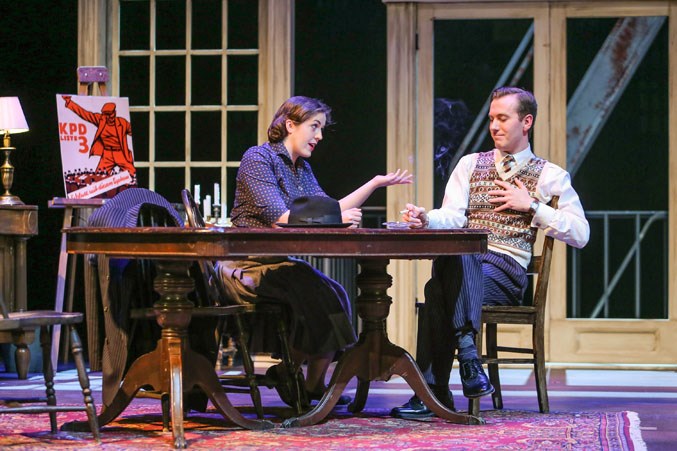Donald Trump and Adolf Hitler are both skewered in Studio Theatre's current production of A Bright Room Called Day.
REVIEW
A Bright Room Called Day
Studio Theatre
Runs until Saturday, Oct. 21
Timms Centre for the Arts
87 Ave. and 112 St.
Tickets: $12 to $25. Call 780-492-2495 or online at http://www.ualberta.ca/artshows
There is no doubt American playwright Tony Kushner's
A Bright Room Called Day playing at the Timms Centre asks many questions.
But the questions are blurred and the answers even less forthcoming.
A Bright Room was one of Kushner's early works originally produced in 1985 by New York's Heat and Light Company. It sought to align President Reagan's questionable political strategies to Adolph Hitler's swift ascent to power.
With the permission of Kushner, University of Alberta MFA directing candidate Brenley Charkow has updated the script to the 21st century and President Trump is the target.
The first act is set primarily in a 1932 Berlin apartment where a half-dozen bohemian friends meet regularly. These liberal, left-leaning artists sit around a table drinking, eating, laughing and debating various political ideologies.
The characters are a Hungarian cameraman, a Communist sympathizer, an opium-addicted actress and an openly homosexual sexologist. Weaving in and out of the apartment is a phantom-like, homeless old woman.
As political uncertainty escalates, these ordinary men and women find themselves thrown off balance, and their personal and interpersonal tensions rise.
With Fascist party members controlling every aspect of society, each character faces three choices – take a stand, escape using false passports or try to survive the onslaught of misery.
The connection to the 21st century is formed through Zillah, a modern, disenchanted Jewish character who moves to Germany. Through her fascination with history, she witnesses the end of the Weimar Germany all the while spewing venom at Trump's personal choices and political policies.
Through Zillah, Charkow in her updates, clearly equates the Reichstag burning and the genocidal policies of the Third Reich to Trump's Charlottesville riots and North Korean nuclear standoff.
Judging by Trump's contentious policies and statements, he needs to be reined in. However Zillah's analyses of history in comparing the United States president to Hitler are at times questionable.
It's clear Kushner sympathizes with liberal and leftist moral outrage, but the characters frequent lapses into pseudo-intellectualism goes nowhere and often sow the seeds of failure.
The playwright adapts a Brechtian patina resulting in the production moving fairly slowly. At times it even threatens to lose momentum.
However, the fourth year Bachelor of Fine Arts actors' solid chemistry and compassion for their characters keep it on track.
Erin Pettifor's Agnes, whose apartment is command central, is gentle, ambivalent and confused. Joel David Taylor, Agnes' one-eyed boyfriend, is both a hot-headed Trotsky revolutionary and caring lover.
Hayley Moorhouse as Gotchling, an underground Communist rebel, delivers not only a strong manifesto, but a commanding presence. And Silverius Materi as Baz, the sexologist, exquisitely balances the line between flamboyance, sensitivity and terror.
As the lone American dissident, Hillary Warden's Zillah is at once over-the-top as well as naive and mutinous.
To enhance the ambience, sound designer Michael Caron has selected a blend of 1930s music that is sweetly innocent, a sharp contrast to the black and white film clips of Hitler's Nazi regime and the gas chambers.
Set designer Lee Livingstone's traditional apartment set is framed by a surtitle sign that flashes a play-by-play of political events occurring from 1932 to 1933. Although the surtitles provide a helpful guide to Hitler's rise to power, at times it feels as if the live action on stage is a mere fill for the political flashes.
A Bright Room Called Day is very much an intellectual slice of theatre. This production distances itself from emotion and asks us to consider what we would do similar situations. If current political policies threaten our democratic institutions, what would you do?




